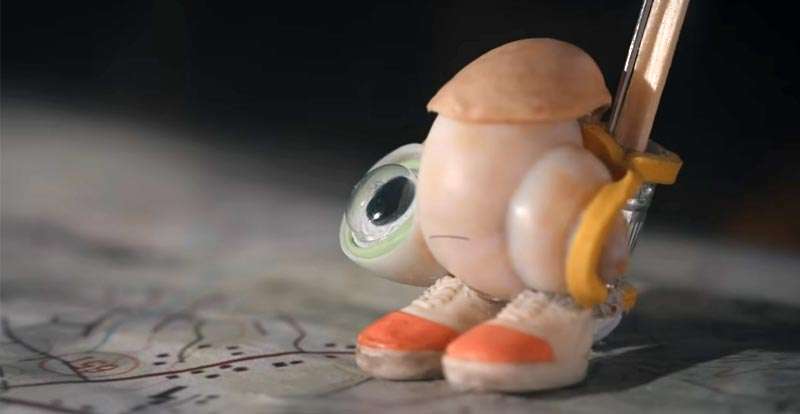What was expected from a Marcel the Shell movie were micro hijinks set to Slate’s frank take on the character. Of course I use a tennis ball with a little hatch to get around the house, what of it? What’s unexpected is the larger commentary on documentary filmmaking and Internet culture. The former asks questions I’ve always wondered about, like when does it become acceptable for a documentarian to intervene? How long do they have to watch a subject struggle with a task before they become cruel, devaluing the rapport they’ve presumably been building with the subject to the point that they’re always following them around with a camera? Marcel’s not a babe in the woods, wowed by everything not made for a creature his size, but he is mystified by this whole process and frequently makes incisive comments about Camp and his presence that interrogate his purpose. Regarding the low-hanging fruit of Internet culture, I never tire of films that reiterate the general falseness and uselessness of it, from Ingrid Goes West to this, where parasocial relationships give people license to take huge liberties with the subject of their obsessions. A film made with the decidedly old-school technique of stop-motion uses the plot to reinforce this idea, as new-fangled social media fails to help Marcel and they have to turn to hoary institutions like 60 Minutes and Lesley Stahl, beloved by both Marcel and Grandma Connie.
Amidst the satire and observational comedy comes the film’s greatest asset, which is its ability to deeply move the viewer. Camp has a firm grasp on what reducing the world to shell size can give to his film, and it’s packed with moments that fill the central house with beauty. The film knows to slow down and enjoy scenes lit with gentle rays of sunlight while Marcel and Grandma Connie ice skate through layers of dust on an end table, or to let characters belt out entire songs in their squeaky voices if the moment calls for it. One of the only times that the film leaves Marcel’s house is when Camp takes Marcel for a drive to look for the boyfriend’s car, and they end up on a hillside overlooking the city. These kind of world-expanding moments are frequently joy-filled for characters who’ve previously lived in small spaces, but for Marcel, it’s a reminder of his insignificance and the near-impossibility of his task, and the inversion of expectations hits hard. The biggest source of emotion comes from Grandma Connie, who affectionately calls Marcel ‘Mar-chel-o.’ Oh, to be given an Italian-infused nickname by Isabella Rosselini. Grandma Connie’s at the beginning stages of dementia, and Rosselini infuses a little bit of sleepiness into her performance. The vital younger version of the character is still in there, but less and less, and it’s as fully realized a depiction of the cruelty of aging as any non-shell performances. Camp keeps finding memorable ways for Connie to make a huge impact on the film, each more impactful than the last.
For every heartstring-pulling moment, few films cut the treacle as well as Marcel the Shell With Shoes On. Writers Camp, Slate, Nick Paley, and Elisabeth Holm balance indie irony with earnestness at an expert level. They don’t scold the viewer for being sappy, but acknowledge how hard it can be to craft a genuine moment. The pursuit of perfection gets messed with by an ill-behaved dog or a badly timed gust of wind, turning tears into laughter and then back to tears. This is a beautiful, intelligent, and funny work, boosting nicecore into one of my favorite subgenres when done right. It might sit uncomfortably next to body horror and black comedy, but nicecore will undoubtedly figure out how to get along. A-

 RSS Feed
RSS Feed